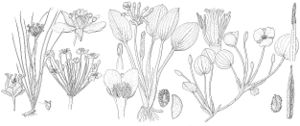Limnocharitaceae
Herbs, perennial, rhizomatous or stoloniferous, caulescent, glabrous; sap milky. Roots not septate. Leaves basal [alternate], submersed and floating [emersed], sessile or petiolate, sheathing proximally; blade with translucent markings absent, basal lobes absent; venation reticulate, primary-veins parallel from base of blade to apex, secondary-veins reticulate. Inflorescences scapose umbels, floating [erect], bracteate. Flowers bisexual, hypogynous, pedicellate; sepals persistent, 3; petals deciduous, 3, usually delicate; stamens [6–] 20–25, distinct; anthers 4-loculed, dehiscing longitudinally; pistils [3–] 10–12, coherent proximally [distinct], 1-loculed; placentation laminar; ovules 50 or more. Fruits follicles. Seeds: embryo U-shaped; endosperm absent in mature seed.
Distribution
Introduced; tropical and subtropical regions, North America, Central America, South America, Asia, Africa, Australia
Discussion
Another genus, Limnocharis, was reported from southern Louisiana and southern Florida (W. C. Muenscher 1944). The genus was not included for Louisiana by J. W. Thieret (1972); it was included by R. K. Godfrey and J. W. Wooten (1979) on the basis of Muenscher’s report although the authors stated that they had seen no specimens from the United States. Also, the genus is not mapped in the "Florida Atlas" (available on the Internet). Richard Wunderlin, primary compiler of the "Atlas"," has indicated that no specimens have been examined (pers. comm.).
Genera 3, species 8 (1 genus, 1 species in the flora).
